INSIDER
News & Business
//
Industry Acquisition
Resideo Technologies Strikes $1.4B Deal to Acquire Snap One
Resideo Technologies has agreed to buy Snap One Holdings in a deal that strengthens its position in security products distribution.
Resideo has agreed to acquire Snap One for $10.75 per share in cash, for a transaction value of approximately $1.4 billion, including forecasted net debt of Snap One at the closing of approximately $460 million. This represents a 7.4x multiple on Snap One’s Adjusted EBITDA for the 12 months ended Dec. 29, 2023, as further adjusted by including Resideo’s projected annual run-rate synergies of $75 million.
Upon closing, Snap One will integrate into Resideo’s ADI Global Distribution business, according to an announcement.
The transaction will combine ADI’s position in security products distribution and Snap One’s complementary capabilities in the smart living market and Control4 technology platforms, which is expected to drive increased value for integrators and financial returns. Together, ADI and Snap One will provide integrators an increased selection of both third-party products and proprietary offerings through an extensive physical branch footprint augmented by industry leading digital capabilities.
“The acquisition of Snap One is an exciting step in Resideo’s continued transformation through portfolio optimization, operational enhancements and structural cost savings actions,” said Jay Geldmacher, Resideo’s president and CEO.
Since its founding, Snap One has grown from a startup built by entrepreneurial integrators to an industry leader in smart technology, stated Snap One CEO John Heyman.

The acquisition will combine Snap One’s capabilities for smart living integrators with ADI’s complementary position in adjacent security products distribution. This cross-category expansion will allow the combined organization to materially deepen relationships with integrators to better serve their customers and expand their businesses, according to the announcement.
The combined entities are expected to meaningfully accelerate ADI’s existing exclusive brands strategy, leveraging Snap One’s proprietary product portfolio and product development expertise while providing broader availability through ADI’s network of commercial and residential integrators and omni-channel capabilities.
The combined company intends to leverage increased opportunities around innovation to drive value for integrators through a pipeline for proprietary products. Snap One generated 66 percent of sales from proprietary products in 2023 and these offerings typically carry significantly higher gross margins than third-party products, according to the announcement.
ADI’s and Snap One’s professional integrators will benefit from significant synergy on go-to-market with Snap One's e-commerce expertise and integrator support platforms and ADI’s 195 stocking locations and extensive digital capabilities. The combination is expected to create an omni-channel experience for integrators, simplifying the buying experience and enhancing product availability. Additional opportunity exists to enhance value within the Control4 integrator base through increasing service levels, rapid product fulfillment and expanding exclusive offerings.
The transaction is expected to be completed in the second half of 2024, and is subject to customary closing conditions, including receipt of applicable antitrust and other regulatory approvals. The transaction has been unanimously approved by the Boards of Directors of Resideo and Snap One. Private investment funds managed by Hellman & Friedman LLC, holding approximately 72 percent of the outstanding common shares of Snap One, have executed a written consent to approve the merger, thereby providing the required stockholder approval for the transaction.
Resideo intends to use proceeds from committed debt financing, cash on hand, and a $500 million perpetual convertible preferred equity investment from Clayton, Dubilier & Rice LLC (CD&R) to fund the transaction.
Evercore and Raymond James & Associates are acting as financial advisors and Willkie Farr & Gallagher LLP is acting as legal counsel to Resideo. Bank of America and Morgan Stanley have provided committed financing for the transaction and are also acting as advisors to Resideo. Moelis & Company LLC and J.P. Morgan Securities LLC are serving as financial advisors to Snap One and have each provided a fairness opinion to Snap One's board of directors. Simpson Thacher & Bartlett LLP is serving as Snap One's legal counsel. //
Valsoft Corp. Enters the Sales Management Software Space With WeSuite Acquisition
Valsoft Corporation Inc., a Canadian company specializing in the acquisition and development of vertical market software businesses, announced the acquisition of WeSuite, a provider of sales management software solutions tailored for the security and technology services sectors.
Since its inception in 2008, WeSuite has been providing comprehensive solutions that streamline complex processes. The suite begins with WeOpportunity, a platform designed to boost sales prospecting, lead generation, and pipeline management, positioning businesses for success in a competitive market. WeEstimate further elevates the suite by offering sales teams control over configuration, pricing, and quoting, complemented by a framework for approvals, contracts, and commissions. Additionally, QuoteAnywhere caters to field sales professionals with real-time, interactive quoting through visualization and product positioning. Collectively, these offerings highlight WeSuite's dedication to innovation by providing the necessary tools for clients and partners to thrive in a dynamic business landscape.
“Our goal is to ensure the future of our incredible and dedicated team, and to continue to provide our clients the best of breed software WeSuite is known for,” said Tracy Larson, president, WeSuite and Michael Fazio, chief technology officer, WeSuite, in a joint statement. “We are extremely excited to be a part of a company that will continue to enhance our legacy and has an existing global presence in the security software space.”
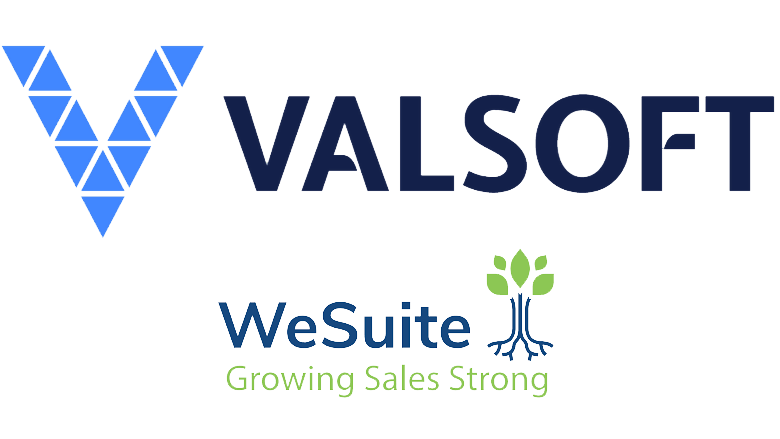
Valsoft is delighted to confirm that founders Larson and Fazio will maintain their current roles at WeSuite following the acquisition, ensuring continuity of the exceptional leadership and innovative ethos that have been integral to WeSuite’s achievements.
“We are excited about the opportunities WeSuite will bring to our sales management portfolio,” said Gustavo Vargas, operating partner of Valsoft’s operational arm, Aspire Software. “WeSuite’s unmatched commitment to client satisfaction, coupled with a strong management team and solid product offerings, will unlock great opportunities for customers, employees and other Valsoft businesses in related industries.” //
Chimera Integrations Readies Cybersecurity Reseller Program for Prime Time
Following the purchase of cybersecurity specialist AlchemyCore last year, Chimera Integrations is now moving headlong into reselling cybersecurity services to its brethren in the physical security integration channel.
Developing a robust cybersecurity program for Chimera while also serving as a cybersecurity reseller to other integrators, AlchemyCore is aimed at addressing critical vulnerabilities in the industry while aligning with evolving market trends. Consider the inherent risks faced by integrators due to their extensive access to client networks, as Justin Stearns, Chimera’s co-founder and vice president, explained to SDM, highlighting the dual rationale behind the acquisition.
“Firstly, integrators are in a fairly unique position,” he explained. “While there are plenty of trades that have their hands in their customers’ networks, integrators are focused on physical security, which makes us a bigger target and a bigger threat to our clients. Prior to the acquisition, we found very few cybersecurity solutions that went beyond the cookie cutter while filling our industry’s niche needs.”
The Syracuse, N.Y.-based integrator was also constantly seeing major gaps between physical security and cybersecurity. Stearns emphasized the disconnect between how organizations manage their physical security and their cybersecurity, often with little communication between the two departments.
“It’s time these two worlds come together to offer a holistic solution that stops the pendulation between cybersecurity and physical security,” he said.
Stearns expressed concerns about the future of security integration as an industry. “An increasing amount of high-level systems are becoming plug and play and offer easy installation for the end user without the use of an integrator,” he noted. “MSPs now more than ever are offering surveillance and access control, utilizing solutions like Meraki and Verkada. We used to just compete against other integrators. Now we find we’re losing opportunities to MSPs and other low voltage trades more and more.”
IMAGE COURTESY OF CHIMERA

From the onset of folding in AlchemyCore, Chimera leadership has proceeded methodically in building out a cyber offering as well as devising a go-to-market strategy. Late last year, the company identified a select group of key clients the new offering appeared most logical for initial outreach. The first integration was with an existing client, a regional federal credit union.
As Stearns explained, federally insured credit unions must abide by a plethora of cyber-related regulations including PCI compliance, FFIEC, AML, GLBA, state-level requirements, and the National Credit Union Administration (NCUA). The regulatory mandates involve penetration testing, endpoint detection and response (EDR), mandatory reporting, and — what stood out to Chimera the most — requirements around the supervision of technology service providers.
“That’s a big deal. The credit union we were working with was using [Chinese-made] cameras prior to Chimera’s involvement, which were banned by the FCC in early 2023,” Stearns said. “As a practice we were already planning on replacing the system with one that was NDAA compliant as well as SOC2 certified. With the new understanding of Chimera’s liability as a vendor for the credit union and the new offering we could approach the organization with, utilizing AlchemyCore and Chimera Integrations was a solution that made sense for everyone. Not to mention that from a business perspective we just increased our RMR by $859 per month without interrupting our day to day operations.”
The cyber expertise behind AlchemyCore includes Chris Maulding, a security engineer who continues to serve as chief technology officer. Maulding, who pens SDM’s Cybersecurity Chronicles column, works with security integrators to assist them in the role of subject matter expert on cybersecurity matters with their end customers.
For more on this story, see the exclusive Q&A with Justin Stearns at the end of this article. — Rodney Bosch, SDM Senior Editor //
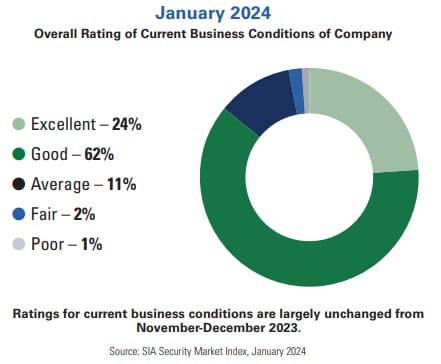
25%
Nearly one in four participants in the SIA Security Market Index survey said that conditions are “excellent,” while more than three in five said they are good. About 11 percent said things are average, while two percent said “fair,” and one percent said “poor.” The numbers are largely unchanged from the November-December survey.
// Source: SIA
Carrier to Divest Industrial Fire Unit in $1.4B PE Deal
Carrier Global Corp. has agreed to sell its Industrial Fire business, which includes brands Det-Tronics, Marioff, Autronica and Fireye, to Sentinel Capital Partners for an enterprise value of $1.4 billion.
The transaction represents the latest step in Carrier’s ongoing portfolio transformation, following the recent acquisition of Viessmann Climate Solutions and the recently announced agreements to sell Carrier’s Global Access Solutions business to Honeywell for nearly $5 billion and its Commercial Refrigeration business to Haier for $775 million.
Carrier said it continues to prepare for the last of its four announced business exits — its combined commercial and residential fire businesses.
With approximately 1,400 employees operating in more than 20 countries, Carrier’s Industrial Fire business is a global provider in fire detection and suppression solutions for high-hazard applications across verticals such as critical infrastructure, oil and gas, marine and clean energy.
The pending sale will allow the business to build on the strength of its advanced lifecycle solutions, strong customer relationships and high growth potential across key segments, according to the announcement.
IMAGE COURTESY OF CARRIER

“This transaction marks another milestone in our transformation as we become a more focused, higher growth company, and furthers our vision to become the global leader in intelligent climate and energy solutions,” said Carrier Chairman and CEO David Gitlin.
Carrier expects net proceeds from the transaction to exceed $1.1 billion and intends to use the proceeds to pay down debt. Closing is expected in the third quarter of 2024 and is subject to regulatory approvals and customary closing conditions.
Goldman Sachs & Co. LLC and J.P. Morgan Securities LLC are serving as financial advisor to Carrier. Paul, Weiss, Rifkind, Wharton & Garrison LLP and Linklaters LLP are providing external legal counsel. //
Charting Success
Factors impacting security integrators
The report also shows the continuing evolution of the CSO role in leading artificial intelligence (AI) implementations. While more important than ever, many lack the appropriate budget or authority to take full advantage of new technologies — posing a challenge to upgrading security systems.
// Source: Brivo

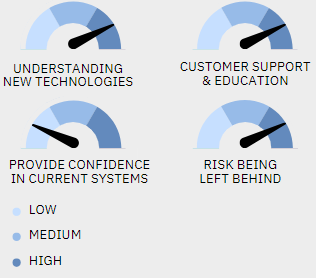
Rapid Response: First Third-Party Monitoring Center to Receive UL Listing for AVS-01
Rapid Response Monitoring Services, an early adopter of the new TMA-AVS-01 Alarm Validation Scoring Standard, has earned the Underwriters Laboratories UL-CAVS listing to become the first third-party monitoring center to both adopt the standard and receive the UL listing.
“AVS-01’s accurate scoring and classification of intrusion alarms improves situational awareness and allows specialists to relay a more comprehensive depiction of what is happening at the premises,” said Morgan Hertel, vice president of technology & innovation, Rapid Response. “This standard is a critical need for our industry, so we dedicated substantial resources to put it in place and secure the UL listing as soon as possible.”
AVS-01 is an American National Standards Institute (ANSI) compliant standard developed by The Monitoring Association (TMA) to enhance professional monitoring services. Rapid Response fully deployed AVS-01 on Jan. 15, following two years of preparation and four months of beta testing.
IMAGE COURTESY OF RAPID RESPONSE
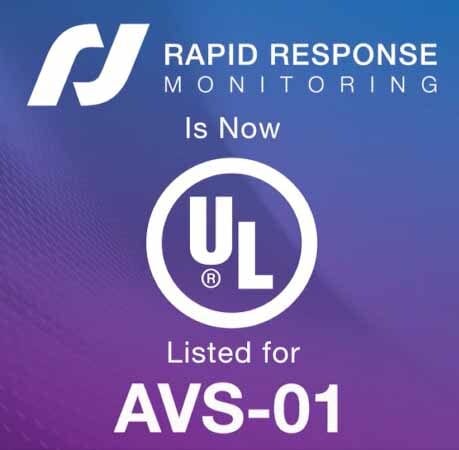
“Our customized and fully proprietary monitoring software analyzes alarm data, applies AVS-01 standardized scoring, and generates a priority level for all intrusion alarms,” said Rapid Response President Jeffrey Atkins. “This score is based on the probability of unauthorized activity at the location. Communicating AVS-01 scores to authorities during dispatch results in enhanced protection, reduced calls for service, increased customer satisfaction, and a competitive advantage for our Rapid Response Dealers. For these reasons, delaying deployment was simply not an option.” //
FCC Launches Cybersecurity Labeling Initiative for Smart Products
The Federal Communications Commission (FCC) voted to create a voluntary cybersecurity labeling program for wireless consumer Internet of Things (IoT) products. Under the program, qualifying consumer smart products that meet robust cybersecurity standards will bear a label — including a new “U.S Cyber Trust Mark” — that is intended to help consumers make informed purchasing decisions, differentiate trustworthy products in the marketplace, and create incentives for manufacturers to meet higher cybersecurity standards.
The U.S. Cyber Trust Mark logo will initially appear on wireless consumer IoT products that meet the program’s cybersecurity standards. The logo will be accompanied by a QR code that consumers can scan for easy-to-understand details about the security of the product, such as the support period for the product and whether software patches and security updates are automatic.
Examples of eligible products may include home security cameras, voice-activated shopping devices, internet-connected appliances, fitness trackers, garage door openers and baby monitors.
The voluntary program will rely on public-private collaboration, with the FCC providing oversight and approved third-party label administrators managing activities such as evaluating product applications, authorizing use of the label, and consumer education.
Compliance testing will be handled by accredited labs.
IMAGE COURTESY OF GERD ALTMANN FROM PIXABAY

The FCC is seeking public comment on additional potential disclosure requirements, including whether software or firmware for a product is developed or deployed by a company located in a country that presents national security concerns and whether customer data collected by the product will be sent to servers located in such a country.
It’s been estimated that there were more than 1.5 billion attacks against IoT devices in the first six months of 2021 alone. Other estimates forecast there will be more than 25 billion connected IoT devices in operation by 2030. The cybersecurity labeling program is said to build on the significant public and private sector work already underway on IoT cybersecurity and labeling, emphasizing the importance of continued partnership so that consumers can enjoy the benefits of this technology with greater confidence and trust.
The FCC voted to create the new program on March 14, culminating years of work by the Biden Administration, the National Institute of Standards and Technology (NIST), government agencies and private stakeholders. //
Everon Fetes Grand Opening of Innovation & Operations Center in Dallas
Everon, formerly ADT Commercial, celebrated the opening of the Everon Innovation and Operations center in the Dallas area. Referred to as Everon iO, the new facility is designed to be a hub of learning, innovation, and industry-leading collaboration.
Everon iO is home to the company’s dedicated monitoring and customer operations center, groundbreaking Innovation Lab, and Solutions Showcase demo area.
A testament to the Everon brand and mission, the spaces contained within the iO demonstrate over a decade of commitment to commercial security, fire, life safety and service excellence, according to an announcement. The Solutions Showcase on site features more than 15 manufacturer partner technologies on display to exhibit the comprehensiveness of Everon’s solutions portfolio.
Here, customers and prospects can engage with live, in-depth demos of Everon’s core product offerings, highlighting a renewed commitment to solutions that meet customers’ unique challenges. Featuring solutions that range from access control, video solutions, and analytics, to fire and sprinkler technologies, emergency communication systems, weapons detection, and more, the Solutions Showcase provides end users with a hands-on experience to help them visualize these solutions in their own facilities and assess the value they can provide to their organization.
IMAGE COURTESY OF EVERON
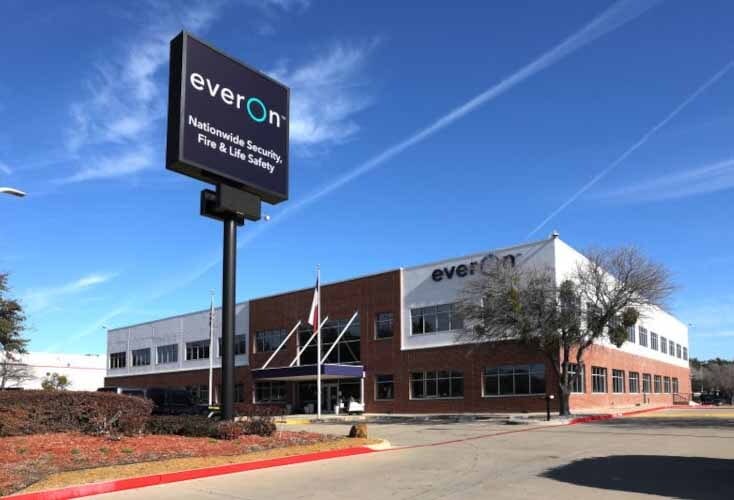
“The whole purpose of the iO has been to offer a space for customers and industry professionals to directly interact with our vision as a leading commercial integrator,” said Everon CEO Dan Bresingham. “The Solutions Showcase takes that vision to the next level. Customers can see exactly how these solutions are designed to work for them, and know that Everon is here to make sure they have access to the best technologies and service in the industry.”
To echo that dedication to bring the best value in technology to customers, the Everon Innovation Lab housed at the iO was designed to refresh that commitment to the industry — fostering collaboration between innovation partners, engineers, and project managers to put cutting-edge technologies to the test and help advance commercial security solutions beyond current offerings. //
Allegion Acquires Electro-Mechanical Lock Specialist Dorcus
Allegion has acquired Dorcas, a leading manufacturer of electro-mechanical access control solutions based in Spain.
The privately held company specializes in the production of electric strikes, electro-mechanical and electro-magnetic locks, as well as complimentary access control solutions and door control products. Dorcas solutions are distributed and sold internationally with a strong presence across European markets, including healthcare and education verticals.
Dorcas will operate as part of the Allegion International segment, led by Allegion Senior Vice President Tim Eckersley.
“Dorcas’ electric strikes and locks are integral elements of access control systems, and adding this business to Allegion International is another strategic investment in the health and quality of our portfolio,” Eckersley said. “Combined, our teams will specify and supply a broader range of seamless access solutions across customers and channels.”

To support a smooth integration, Dorcas CEO Pablo Ibáñez will join Allegion as managing director of the Dorcas business.
“Joining Allegion offers new routes to market and accelerated growth opportunities for Dorcas,” Ibáñez said. “Our cultures of innovation and putting customers first align, providing a very exciting future ahead.” //
Brinks Home Celebrates Virtual Tech Platform Success
Brinks Home announced the success of its Virtual Tech program, an innovative initiative designed to enhance customer service while optimizing operational efficiency. The program, which recently completed more than 10,000 successful jobs, leverages cutting-edge technology to deliver expedited service to customers, reducing the need for onsite technician visits, according to an announcement.
Spearheaded by Jonah Serie, senior vice president of field operations, Brinks Home, the program officially launched in January 2023 with a team of nine experienced technicians drawn from various regions across the country. The program harnesses the power of TechSee, an advanced app that enables remote troubleshooting of customers’ security systems. Through this app, technicians can visually assess issues using the customer’s camera, streamlining the diagnostic process and expediting resolution.

“Our aim with the Virtual Tech program was twofold: to minimize unnecessary truck rolls and to provide our customers with faster, more efficient service,” Serie said. “We handpicked technicians with diverse technical expertise and customer-facing skills to ensure a seamless transition to this innovative approach.”
Since its inception, the Virtual Tech program has exceeded expectations, completing more than 7,000 jobs in 2023 alone and handling a wide array of service requests, including add-ons, moves, break-fixes, and certain installations. Customer feedback has been reportedly positive, with customers praising the speed and effectiveness of the virtual troubleshooting process. The program’s efficiency is underscored by its ability to close service tickets twice as fast as traditional field technician visits, providing customers with a superior experience and significant time savings.
“To date, the program has revolutionized our service delivery and generated substantial cost savings, exceeding $3 million within its first year,” Serie added. //
Latest Pye-Barker Buy Expands Fire Code-Compliance Capabilities in Mid-Atlantic
Pye-Barker Fire & Safety has acquired Absolute Fire Protection, a fire sprinkler and fire alarm company based in Annapolis, Md.
Absolute Fire Protection serves the Washington, D.C.-Baltimore metro area, all of Maryland and areas of Delaware. The acquisition strengthens Pye-Barker’s growing presence in the Mid-Atlantic and amplifies the company’s ability to provide full fire code-compliance to businesses across the region.
Absolute Fire Protection provides end-to-end fire sprinkler services, fire alarm installation and 24/7 alarm monitoring. It was founded in 1989 by Larry Cate and Dan Mathias who met as Maryland high school freshmen and dreamed of starting their own business, according to an announcement. While they were still in college — Cate at Towson University and Mathias at University of Maryland — Absolute Fire Protection was born.
“From a single sprinkler job when we were 22 years old to a thriving business with more than 100 team members, we’re proud of what we’ve built at Absolute Fire," Cate said. “We trust Pye-Barker to honor Absolute’s legacy as we take this next step.”
Cate and Mathias proudly promote the industry to youth with investment in their community college’s skilled trade development center and the creation of an advanced training facility for Absolute's apprenticeship program.
IMAGE COURTESY OF PYE-BARKER

“Our team’s career paths depend on our company’s growth, and Pye-Barker’s resources will provide a new level of opportunity for everyone to progress,” Mathias said.
“Larry and Dan are the type of people we admire at Pye-Barker — go-getters who worked hard to build their business and use their success to uplift others,” said Bart Proctor, CEO at Pye-Barker. “We’re honored to carry on their legacy with the highly skilled Absolute team.”
Cate, Mathias and Absolute’s technicians and engineers will continue to serve customers in the Mid-Atlantic.
Pye-Barker Fire & Safety, which bills itself as the largest fully integrated and full-service fire protection, life safety and security services provider in the United States, has more than 200 locations and 6,000 team members nationwide. The company ranked No. 8 on the 2024 SDM 100. //
ASSA ABLOY Global Solutions Adopts ALCEA as Its Primary Brand
ASSA ABLOY Global Solutions announced that its critical infrastructure offering will adopt ALCEA as its main brand.
With roots in the security solutions industry dating back to 1995, French-based ALCEA SAS was acquired by ASSA ABLOY Global Solutions in 2022. The introduction of the renewed brand marks the beginning of a journey to position ALCEA as a provider of total security solutions for critical infrastructure worldwide, according to the announcement.
By integrating products, solutions and services from ASSA ABLOY, ALCEA, ABLOY and third-party companies, ALCEA is set to enhance ASSA ABLOY Global Solutions’ position as a unique solution provider and trusted partner to several strategically important industries globally, the announcement stated.
“When critical infrastructure such as energy, water, telecom or transportation is interrupted, societies can’t thrive,” said Stephanie Ordan, executive vice president and head of ASSA ABLOY Global Solutions. “ALCEA exists to protect critical infrastructure globally and ensure businesses and people can continue to feel safe and operate uninterrupted.”
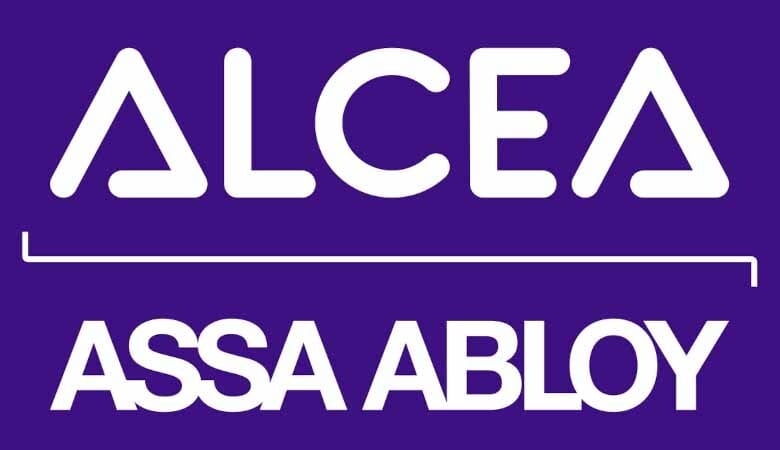
Placing ALCEA as the main brand for critical infrastructure offerings creates a more focused messaging with a clear identity, the announcement stated. The brand will continue to uphold and expand service levels for customers, with an increased focus on customized security solutions.
“Our critical infrastructure offering has traditionally consisted of solutions provided by ABLOY. As part of this shift, we're incorporating ABLOY solutions under the ALCEA brand, which will further strengthen our position and allow us to deliver an even broader range of high-quality services to our customers,” Ordan said.
ALCEA’s sector specialists are said to leverage in-depth knowledge by providing customizable solutions and products to sectors such as water, energy, telecom, transportation, mining, oil and gas. The offering comprises digitally optimized security solutions, including access control, intrusion detection, visitor, key, and video management. These customizable solutions are said to serve as a total security package or as part of an existing setup, are designed to enhance both security and operational efficiency.
“As we move towards a future where nearly 7 out of 10 people will live in cities by 2050 and digitalization becomes pervasive, the standards for critical infrastructure protection are rising,” said Jorma Issakainen, senior vice president and head of critical infrastructure, ASSA ABLOY Global Solutions. “In a rapidly expanding market, currently valued at over $136 billion, the demand for innovative solutions is greater than ever. That’s why we need to be at the forefront of delivering safe solutions for tomorrow’s needs, something we will continue doing under the brand name ALCEA.” //
HID 2024 State of Security Report Top Trends: Mobile IDs, MFA & Sustainability
HID has released its 2024 State of the Security Industry Report, delving into the underlying concerns driving upcoming innovations and the technologies that underpin them. The report aims to help security leaders to be proactive in adapting to evolving challenges, according to the company.
HID gathered responses from 2,600 partners, end users and security and IT personnel worldwide, across a range of job titles and organization sizes representing over 11 industries. Conducted in the fall of 2023, this year’s survey reveals six themes, as follows:
1. Mobile identity is expected to be ubiquitous in the next five years.
Given the widespread use of mobile devices, momentum continues to build around their use in support of identity. Within the next five years, surveyed end users state that nearly 80 percent of organizations will deploy mobile IDs. Industry partners are even more optimistic in their outlook, stating that 94 percent of their customers will have deployed mobile IDs.
2. Multi-Factor Authentication is widespread, despite slow but growing implementation of Zero Trust.
More than 83 percent of end user respondents said their organization currently uses Multi-Factor Authentication (MFA), mainly due to the vulnerabilities of passwords. For many, this represents the first step on the longer journey toward Zero Trust, an approach to security that calls for organizations to maintain strict access controls and to never trust, always verify anyone — internal or external — by default. Zero Trust has been implemented in 16 percent of organizations with over 100,000 employees and 14 percent in those with up to 10,000 employees, according to the survey.
With MFA being widespread, the eventual end of passwords is imminent. The creation of new standards such as FIDO (Fast Identity Online), which uses “standard public key cryptography techniques to provide phishing-resistant authentication,” will pave the path to new and more secure authentication options that will be part of a more robust Zero Trust architecture.
3. Sustainability becomes a growing driver in business decisions.
Among HID’s survey respondents, sustainability continues to rank high as a business priority, with both end users and partners rating its importance at a “4” on a 1-to-5 scale. Additionally, 74 percent of end users indicate the importance of sustainability has grown over the past year, and 80 percent of partners reported the trend growing in importance among their customers.
IMAGE COURTESY OF HID

As such, there will likely be a continued emphasis on solutions that minimize energy use, reduce waste, and optimize resource usage. A shift to cloud-based solutions and increased use of mobile devices are two clear strategies to reach these sustainability goals.
4. Biometrics continues its impressive momentum.
In this year’s survey, 39 percent of installers and integrators said their customers are using fingerprint or palm print, and 30 percent said they’re using facial recognition. The momentum continues to build as 8 percent plan to test or implement some form of biometrics in the next year and 12 percent plan to do so in the next three to five years.
5. Identity management points up to the cloud.
Nearly half of end users are moving to cloud-based identity management, with 24 percent already using it and another 24 percent in the process of implementing such systems. Industry partners say their customers face several hurdles here, including existing reliance on legacy/on-prem equipment (28 percent), lack of budget (24 percent), and cloud-based identities simply not being a business priority (21 percent).
6. The rise of artificial intelligence for analytics use cases.
Conversations about AI have come to dominate the business landscape, and many security professionals see AI’s analytic capabilities as the low-hanging fruit to enhance identity management. Rather than looking to AI to inform the entirety of the security system, it’s possible to leverage data analytics as a way to operationalize AI in support of immediate outcomes. In this scenario, 35 percent of end users reported they will be testing or implementing some AI capability in the next three to five years, with 15 percent already using AI-enabled biometrics. //

